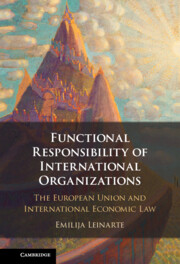 Functional Responsibility of International Organisations
Functional Responsibility of International Organisations from Part II - Functional International Responsibility
Published online by Cambridge University Press: 09 December 2021
Chapter 6 examines how tribunals determine the proper respondent in the trade and investment regimes. It focuses on WTO law and the ECT regime because their mixed form provides a relevant context in which to explore responsibility of the EU and its Member States for joint obligations. In light of an extensive case-law analysis, this study extrapolates patterns in the tribunals’ reasoning. It is argued that WTO dispute-settlement employs what this study refers to as a “the positive solution test” to identify the proper respondent. Arbitral tribunals operating under the ECT, on the other hand, allocate responsibility to the subject which is the proximate cause of harm.
To save this book to your Kindle, first ensure [email protected] is added to your Approved Personal Document E-mail List under your Personal Document Settings on the Manage Your Content and Devices page of your Amazon account. Then enter the ‘name’ part of your Kindle email address below. Find out more about saving to your Kindle.
Note you can select to save to either the @free.kindle.com or @kindle.com variations. ‘@free.kindle.com’ emails are free but can only be saved to your device when it is connected to wi-fi. ‘@kindle.com’ emails can be delivered even when you are not connected to wi-fi, but note that service fees apply.
Find out more about the Kindle Personal Document Service.
To save content items to your account, please confirm that you agree to abide by our usage policies. If this is the first time you use this feature, you will be asked to authorise Cambridge Core to connect with your account. Find out more about saving content to Dropbox.
To save content items to your account, please confirm that you agree to abide by our usage policies. If this is the first time you use this feature, you will be asked to authorise Cambridge Core to connect with your account. Find out more about saving content to Google Drive.